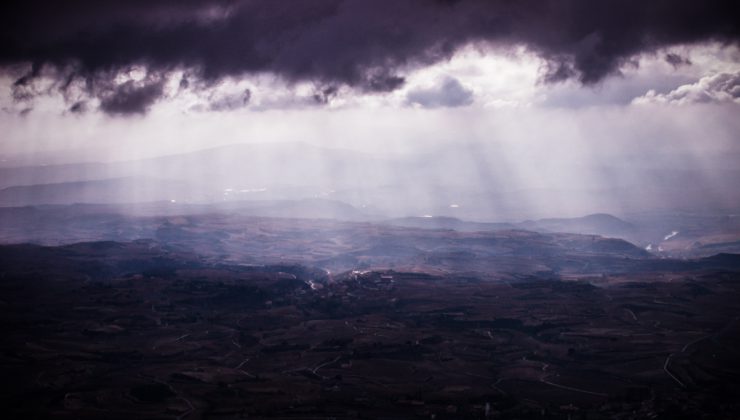Tucked away in 1 Chronicles is a curious description of a certain family of leaders – a line of mysterious men that traces all the way back to Jacob. As David’s rule is being established at Hebron and great men are being irresistibly drawn together to serve a great cause, a group of 200 chiefs break the inner circle to present themselves to David for service. They were called the Sons of Isaachar, an intriguing group described as “men who had understanding of the times, to know what Israel ought to do” (1 Chronicles 12:32).
If I could think of one aching desire within the heart of almost every pastor, every elder, every local church leader who sees the calamitous killings of African American men over the recent months, it would be to join the Sons of Isaachar; to be pastors who “had understanding of the times, to know what Israel ought to do”.
This past Tuesday, an African American named Alton Sterling — a 37 year-old father of five — was shot during a confrontation with two police officers just outside of Baton Rouge, Louisiana. The next day a Minnesota officer fatally shot a man named Philando Castile. In the car at the time was Castile’s girlfriend and her child of 4 years. These are not the only men, just the most recent ones. Others like Gregory Gunn, Freddie Gray, Walter Scott, Michael Brown and LaQuan McDonald may have faded from the news cycle, but they still speak to the African American experience. And each time a white cop pulls the trigger on a black man, their voice grows louder — and rightfully so.
Yesterday President Obama called the shootings an “American issue that we should all care about”. He’s right. Every American should care. But for church leaders, ‘caring’ can’t simply be empathetic feelings. We must be pastors that pulse with the blood of Isaachar. “Men who had understanding of the times, to know what Israel ought to do” (1 Chronicles 12: 32).
If you’re a pastor, you’ll probably be standing in front of people somewhere in the next 48 hours. Some will be immensely curious on your take. For others, the blue moon of their location, race, interests or comforts may eclipse the blazing sun of these events. Yet both groups must hear the voice of Isaachar. For some, to awaken to the times; for others, to know how to act within them.
Here’s what your people need to hear…
It’s a time to grieve.
Black men are dying. Families are experiencing terrible loss. They will awaken next week to an empty space in their life that will never be filled. Black lives do matter, particularly to those that love them most.
But African Americans are not alone in their dark night of loss. Last night, two snipers ambushed police officers in Dallas during a #BlackLivesMatter protest. At last count, 5 police officers are dead, seven were injured. The suspect told police he was upset by recent police shootings and “wanted to kill white people.” The result? White police officers are dead. Grief is no respecter of creed or race. It visits every being who draws breath. And it’s present right now in both Baton Rouge, Minnesota, and Dallas.
No one’s talking about assigning blame here. To grieve is not to acknowledge culpability, but to embrace common humanity. It’s not to identify cause, but loss. Black men are dead and everyone is confused. White police officers are gone. There are some moments in life where lament is the only rational response.
There is “a time to weep, and a time to laugh; a time to mourn, and a time to dance” (Ecclesiastes 3:4).
This weekend is about weeping and mourning. Recognize the moment, then clarify it for your people. It will help them understand the times and know what to do.
It’s a time to listen.
Never has the passage “let every person be quick to hear, slow to speak, slow to anger” (James 1:19) been more relevant than in our present racial climate. It’s a hard word, because it feels like there’s so much to say. So many others are speaking too.
When trust in authority falls, words fly.
Sometimes we have an instinctive desire to provide immediate answers; a pat interpretation that makes the whole mess more sensible. Just wad up this whole race thing, oversimplify it with an anecdote, and stash it somewhere that makes it more comfortable and coherent; a place that makes us feel less vulnerable. I’ve done it myself. Talk too fast, listen too little, walk away with the answers all squared off, complete with neat, tidy corners.
But listening requires more sturdy stuff. The more I have ears to hear, the more my frivolous or impulsive ‘take’ matures into the textured ‘wisdom from above’ (James 3:17).
A few days ago, I tweeted: “#AltonSterling -May God help me fully comprehend, as a white dude, the stab of anger & fear this sparks in our African Amer bros & sisters.” One of the first responses I received was from a thoughtful guy whose son was a police officer. He felt like my prayer to understand #BlackLivesMatter meant that, at least to me, #BlueLivesDontMatter. But listening to one voice does not denigrate the respect we have for another. Listening applies to everyone, no matter the color or vocation.
But some parties have louder microphones. Throughout history, those in authority have most often controlled the message. And if you’re anything like me, you’re hardwired to respect authority. Heck, my undergraduate degree was in Criminology, followed by a stint in a Pennsylvania police academy, and then four years in private security. I’ve even got a son who’s a Captain in the Army. Though my behavior may not always reflect it, we Harveys know how authority works.
It’s been by listening, though, that I’ve discovered the word ‘police’ means something far different to a black man. As a white guy, ‘police’ is a noun – it’s the man or woman appointed to uphold the law and protect me. But I’ve learned that for a black man, ‘police’ is a verb, as in ‘we have been policed, we are policed, and we will be policed”. When a white guy sees a black man being shot by a police officer, his instinctive thought moves towards reasonable cause. He thinks, “There has to be some logic to this!” A black guy is thinking, “Oh God, it happened again.” When Eric Garner is being choked by police officers, every African American around the country is gasping for air.
If you find yourself saying, ‘That’s illogical!”, it may be that there’s a different logic at work. One that can only be understood by listening.
Earlier this week, Jamaal Williams, an African American pastor in Sojourn Network wrote, “As I watched the video of Alton Sterling being shot…I struggled to breathe. Seeing a black man lose his life so quickly, in a public place, reminded me of how quickly I could lose mine at the hand of an officer. It reminded me of the danger of being in a black body.“
We must reach out and listen to the law enforcement community as well. They are not deaf to the pain, or the growing perception, right or wrong, that their authority is being abused by some in their ranks. They wake up each day aware that the acts of a rookie or rogue in Rhode Island may well shape the perception of their role all the way to Alaska. Those in authority are held to a higher standard, and they should be. But just ask them – it is a heavy burden to bear.
I thank God for their sacrifices, I pray for their protection, and they need our prayerful covering (1 Timothy 2:1-3).
Pastor, encourage your people this weekend to listen to their African American friends, neighbors and associates. But also urge them to offer a timely encouragement to the next cop they come across. Sure, it’s baby steps. But at least we’re tumbling in the right direction.
It’s time to discern.
When I say ‘discern’, I’m speaking specifically about the news reported from media sources. If I say there’s a bias in news, one’s mind immediately goes to the embedded conservatism that shouts from Fox News or the entrenched liberal slant that oozes from MSNBC. But that’s the easy buck-naked-in-daylight-type of bias.
The bias I’m speaking of is the drive to make money by creating and perpetuating dramatic stories. That’s not to trivialize tragedy or skirt culpability. It’s merely to recognize that whether it’s CNN or Fox News, everyone is competing for viewers and looking for Nielsen ratings.
Yet the call to ‘discern’ becomes more complicated by the reality of race. We all want a vision of justice that works, but one’s vision of justice is profoundly shaped by the color of their skin. As a white man, I would be more prone to postpone judgment and dissect the drama. A video, no matter how well it is shot, would not necessarily tell the full story. As a white man, I have the luxury of thinking about due process.
An African American may be instinctively suspicious of calls for due diligence. They know that it’s the very lever pulled by those in power to protect unjust actions. Waiting for officials to act, courts to convene, laws to change has been the language used to justify the status quo. Talk about discernment, some black leaders marvel that whites have not discerned and acted upon these injustices more quickly.
Here lies an undeniable tension, and there are no easy answers.
If we are truly serious about justice, it will be grounded in the expedient uncovering of truth. This means when a black man dies during an arrest, those in authority need to rush forward with the facts. True discernment is persistent about truth.
Yet true discernment deals in patience as well. To ‘understand the times’, we must be willing to suspend impulsive conclusions even while we insist upon an immediate release of the facts. This is not denial, cluelessness, or dereliction of duty. It’s what enables a good leader to align his response to the facts. More importantly, it’s what you would want of others if you were suddenly and unexpectedly perceived as a lawbreaker or life-taker (Luke 6:31).
Pastors, encourage your people towards a definition of discernment that can see beyond their own experience. Call your people to suspend impulsive judgments while they grieve. And then pray that justice will come swiftly.
It’s time to pray.
This is not the obligatory point on prayer. These events are shaking our country with seismic force creating a fault line beneath the surface of our national unity. This dividing line is now discernible to the naked eye and inches wider with the passing of each week. And for this particular societal problem, policies will not ultimately repair it; protestors will not eventually improve it; politicians will not finally heal it. It’s a dividing line etched in our genetics that runs straight through the human heart.
Yes, I’m saying this is spiritual. It’s not spiritual-only, since souls reside in diversely-colored bodies. But it must be addressed and attacked spiritually.
“For we do not wrestle against flesh and blood, but against the rulers, against the authorities, against the cosmic powers over this present darkness, against the spiritual forces of evil in the heavenly places.” (Ephesians 6:12)
Some wounds are so deep that the remedy begins through the surgery of prayer. We must call our churches to appeal to the Divine Warrior — our Father who art in Heaven — to wage war and deliver us from evil. We must cry out that He forgive us, even as we forgive those who sin against us (Luke 11:4). And ask him to unleash the power of His Spirit upon our people and our communities, that the powers of this present darkness may be extinguished by His glorious light.
I can’t improve upon the words of Ronnie Martin, one of our beloved pastors (and old sages) in Sojourn Network,
“Will we stand together as one network this Sunday? Will we gather with our people and pray, preach, sing and pray for the loss, the injustice, and the expediency of our merciful and gracious Lord to redeem all things? He will hear us. He will act. He will move.”
Let Issachar Speak
It’s seems relevant to say my second son is an African American. He’s delightful man of 23 with personality brimming from every pore. The other night I sent him a text reminding him to be careful, particularly if he is pulled over.
I long for the day when texts like that are unnecessary; when race is significant only in the way that it magnifies the Glory of the Lamb; when there will no longer be the need for police, protection, or politics. But as I sit here in a fallen world, I secretly hope that when my son attends church this Sunday, the pastor will bring the eternal Word of God to bear on these turbulent, changing times.
Pastor, serve your people this Sunday. Wade in with a little perspective, provide some pastoral guidance. Lead them in a congregational prayer. Let them see that race, justice, and community safety IS the church’s concern.
In doing so you will walk in the line of Isaachar, “understanding the times, to know what Israel ought to do.” (1 Chronicles 12:32).
(Originally posted at the Sojourn Network blog.)












